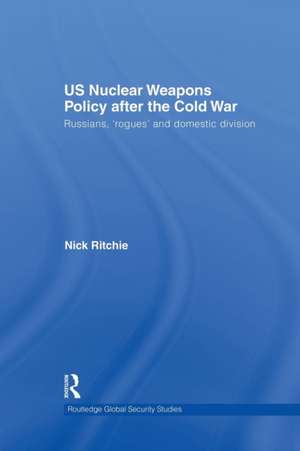US Nuclear Weapons Policy After the Cold War: Russians, 'Rogues' and Domestic Division: Routledge Global Security Studies
Autor Nick Ritchieen Limba Engleză Paperback – 10 apr 2015
Exploring nuclear forces structure, arms control, regional planning and the weapons production complex, the volume identifies competing sets of ideas about nuclear weapons and domestic political constraints on major shifts in policy. It provides a detailed analysis of the complex evolution of policy, the factors affecting policy formulation, competing understandings of the role of nuclear weapons in US national security discourse, and the likely future direction of policy. The book argues that US policy has not proceeded in a linear, rational and internally consistent direction, and that it entered a second post-Cold War phase under President George W. Bush. However, domestic political processes and lack of political and military interest in America’s nuclear forces have constrained major shifts in nuclear weapons policy.
This book will be of much interest to students of US foreign policy, nuclear proliferation, strategic studies and IR in general.
| Toate formatele și edițiile | Preț | Express |
|---|---|---|
| Paperback (1) | 304.90 lei 6-8 săpt. | |
| Taylor & Francis – 10 apr 2015 | 304.90 lei 6-8 săpt. | |
| Hardback (1) | 729.62 lei 6-8 săpt. | |
| Taylor & Francis – 8 aug 2008 | 729.62 lei 6-8 săpt. |
Din seria Routledge Global Security Studies
-
 Preț: 287.82 lei
Preț: 287.82 lei -
 Preț: 294.74 lei
Preț: 294.74 lei - 9%
 Preț: 1073.81 lei
Preț: 1073.81 lei -
 Preț: 326.49 lei
Preț: 326.49 lei -
 Preț: 325.30 lei
Preț: 325.30 lei -
 Preț: 462.81 lei
Preț: 462.81 lei -
 Preț: 492.53 lei
Preț: 492.53 lei -
 Preț: 465.53 lei
Preț: 465.53 lei -
 Preț: 130.92 lei
Preț: 130.92 lei -
 Preț: 481.58 lei
Preț: 481.58 lei - 14%
 Preț: 337.39 lei
Preț: 337.39 lei - 26%
 Preț: 820.71 lei
Preț: 820.71 lei -
 Preț: 416.96 lei
Preț: 416.96 lei - 18%
 Preț: 1052.85 lei
Preț: 1052.85 lei - 18%
 Preț: 1111.90 lei
Preț: 1111.90 lei - 28%
 Preț: 821.53 lei
Preț: 821.53 lei - 18%
 Preț: 1055.51 lei
Preț: 1055.51 lei - 16%
 Preț: 335.12 lei
Preț: 335.12 lei - 13%
 Preț: 324.86 lei
Preț: 324.86 lei - 18%
 Preț: 713.18 lei
Preț: 713.18 lei - 28%
 Preț: 821.14 lei
Preț: 821.14 lei - 18%
 Preț: 729.62 lei
Preț: 729.62 lei - 28%
 Preț: 851.27 lei
Preț: 851.27 lei - 18%
 Preț: 1165.87 lei
Preț: 1165.87 lei - 28%
 Preț: 825.25 lei
Preț: 825.25 lei - 18%
 Preț: 1112.21 lei
Preț: 1112.21 lei - 49%
 Preț: 542.69 lei
Preț: 542.69 lei - 18%
 Preț: 1071.66 lei
Preț: 1071.66 lei - 25%
 Preț: 852.88 lei
Preț: 852.88 lei -
 Preț: 430.37 lei
Preț: 430.37 lei - 18%
 Preț: 1118.46 lei
Preț: 1118.46 lei - 28%
 Preț: 819.50 lei
Preț: 819.50 lei - 18%
 Preț: 1057.40 lei
Preț: 1057.40 lei -
 Preț: 413.33 lei
Preț: 413.33 lei - 25%
 Preț: 826.68 lei
Preț: 826.68 lei - 30%
 Preț: 849.29 lei
Preț: 849.29 lei - 18%
 Preț: 1060.25 lei
Preț: 1060.25 lei - 18%
 Preț: 1123.68 lei
Preț: 1123.68 lei - 28%
 Preț: 820.16 lei
Preț: 820.16 lei
Preț: 304.90 lei
Nou
Puncte Express: 457
Preț estimativ în valută:
58.36€ • 62.99$ • 48.93£
58.36€ • 62.99$ • 48.93£
Carte tipărită la comandă
Livrare economică 18 aprilie-02 mai
Preluare comenzi: 021 569.72.76
Specificații
ISBN-13: 9781138873520
ISBN-10: 1138873527
Pagini: 252
Dimensiuni: 156 x 234 x 13 mm
Greutate: 0.34 kg
Ediția:1
Editura: Taylor & Francis
Colecția Routledge
Seria Routledge Global Security Studies
Locul publicării:Oxford, United Kingdom
ISBN-10: 1138873527
Pagini: 252
Dimensiuni: 156 x 234 x 13 mm
Greutate: 0.34 kg
Ediția:1
Editura: Taylor & Francis
Colecția Routledge
Seria Routledge Global Security Studies
Locul publicării:Oxford, United Kingdom
Public țintă
Postgraduate, Professional, and UndergraduateCuprins
Introduction 1. The policy-making process. Actors involved in nuclear weapons policy. The annual nuclear policy budgetary process 2. American nuclear weapons policy at the end of the Cold War 3. Nuclear weapons policy under George H. W. Bush. Key decisions. Nuclear arms control. Nuclear forces. ‘Rogue’ states and nuclear planning. The nuclear weapons production complex. Conclusion 4. Nuclear weapons policy under Bill Clinton. Nuclear forces. Nuclear arms control. Russia, ‘rogues’ and nuclear planning. The nuclear weapons complex. Conclusion 5. Nuclear weapons policy under George W. Bush. Nuclear policy and the 2001 Nuclear Posture Review. Nuclear forces. Nuclear arms control. The nuclear weapons production complex. Conclusion 6. Post-Cold War trends in nuclear weapons policy 7. The influence of ideas on nuclear weapons policy. Three competing ‘idea sets’ Idea set 1: Managing the drawdown of Cold War nuclear forces Idea set 2: Responding to nuclear proliferation through progress in arms control and disarmament Idea set 3: Responding to nuclear proliferation by re-orienting Cold War nuclear weapons policy to a post-Cold War war-fighting policy Conclusion 8. Domestic politics and nuclear weapons policy. Policy inertia. Political disinterest in nuclear weapons policy. Military disinterest in nuclear weapons policy. Nuclear conservatism and neglect. Conclusion
Notă biografică
Nick Ritchie is a Post-Doctoral Research Fellow at the Department of Peace Studies, University of Bradford. He is co-author of The Political Road to War in Iraq (Routledge 2006).
Descriere
This book offers an in-depth examination of America’s nuclear weapons policy since the end of the Cold War.









